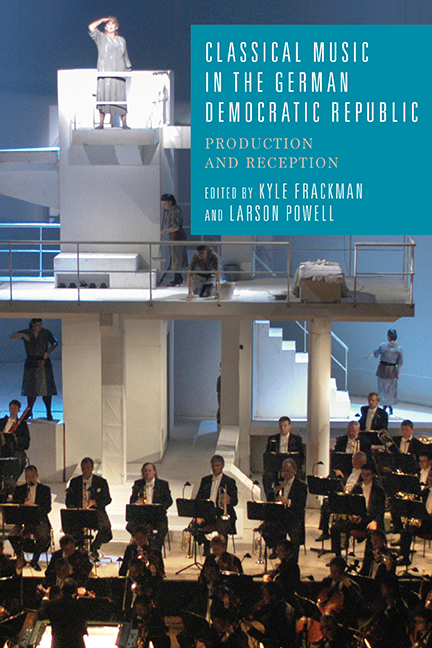Book contents
- Frontmatter
- Contents
- Acknowledgments
- List of Abbreviations
- Introduction: Music and Heritage in the German Democratic Republic
- 1 Provincialism, Modernity, and the Classical Heritage: The Administrative Structure of the GDR and the Situation of Music Production
- 2 Classicism as Anti-Fascist Heritage: Realism and Myth in Ernst Hermann Meyer’s Mansfelder Oratorium (1950)
- 3 Positioning Georg Knepler in the Musicological Discourse of the GDR
- 4 Ehrt euren Deutschen Meister: Reproducing Wagner in the GDR
- 5 The Embodiment of Collective Memory in Neue Odyssee
- 6 Marxism and Feminism in Ruth Berghaus’s Staging of Don Giovanni
- 7 Beyond the Gewandhaus: Mahler and the GDR
- 8 Hanns Eisler’s Funeral and Cultures of Commemoration in the GDR
- 9 Exile—Remigration—Socialist Realism: The Role of Classical Music in the Works of Paul Dessau
- 10 “What a Satisfying Task for a Composer!”: Paul Dessau’s Music for The German Story (. . .Du und mancher Kamerad)
- 11 Friedrich Schenker and the Third Way
- 12 A Prism of East German Music: Lothar Voigtländer
- Notes on the Contributors
- Index
11 - Friedrich Schenker and the Third Way
Published online by Cambridge University Press: 21 May 2021
- Frontmatter
- Contents
- Acknowledgments
- List of Abbreviations
- Introduction: Music and Heritage in the German Democratic Republic
- 1 Provincialism, Modernity, and the Classical Heritage: The Administrative Structure of the GDR and the Situation of Music Production
- 2 Classicism as Anti-Fascist Heritage: Realism and Myth in Ernst Hermann Meyer’s Mansfelder Oratorium (1950)
- 3 Positioning Georg Knepler in the Musicological Discourse of the GDR
- 4 Ehrt euren Deutschen Meister: Reproducing Wagner in the GDR
- 5 The Embodiment of Collective Memory in Neue Odyssee
- 6 Marxism and Feminism in Ruth Berghaus’s Staging of Don Giovanni
- 7 Beyond the Gewandhaus: Mahler and the GDR
- 8 Hanns Eisler’s Funeral and Cultures of Commemoration in the GDR
- 9 Exile—Remigration—Socialist Realism: The Role of Classical Music in the Works of Paul Dessau
- 10 “What a Satisfying Task for a Composer!”: Paul Dessau’s Music for The German Story (. . .Du und mancher Kamerad)
- 11 Friedrich Schenker and the Third Way
- 12 A Prism of East German Music: Lothar Voigtländer
- Notes on the Contributors
- Index
Summary
FRIEDRICH SCHENKER (1942–2013) was one of the GDR's most important composers in the 1970s and 1980s, the standard-bearer of the East German avant-garde. Even among his cohort—the “second generation” of composers including Reiner Bredemeyer, Paul-Heinz Dittrich, Friedrich Goldmann, and Georg Katzer—Schenker's work stands out for its unrelenting atonality and dissonance. At times his musical language is downright cacophonous. Regardless of the compositional mode he employed—aleatoric, collage, dodecaphony, free jazz—many hours of his music consist of screeching violins, wailing brass, and thundering percussion. The Dutch composer Konrad Boehmer has called Schenker's music “organized anarchy”; Frank Schneider, dean of East German music critics and a strong proponent of all the GDR composers listed above, has called Schenker's music “virtually unsurpassed in the aural demands it makes.” Schneider meant this as a compliment, but outside of the GDR's New Music community the East German public remained resistant and even hostile to Schenker's music well into the 1980s. Yet Schenker never lacked for support among East Germany's leading performers, including the Leipzig Radio Orchestra's Herbert Kegel and, perhaps more surprisingly, the Gewandhaus Orchestra's Kurt Masur. Both of these conductors admired Schenker's uncompromising vision and rewarded him with highprofile commissions.
Schenker's willingness to irritate, even alienate, his audience was matched only by his propensity for political provocation. His music engendered controversy through pieces that proclaim Marxist ideals with a critical stance toward the Communist Party. He always thought of himself as a communist and believed that a composer was obligated to be politically engaged, that is, to write music that explored the important topics of political life. As he stated in 1989, Schenker saw all art as political. Yet he was also an independently minded man and rejected the SED's tendency toward doctrinarism. As a result, he clashed with the party's cultural bureaucrats, even as they gave him awards for artistic achievement and political engagement. In sum, Schenker was neither a party-loyal composer nor a dissident. He was somewhere between the two, along a political path that has been called the “third way” (dritter Weg).
- Type
- Chapter
- Information
- Classical Music in the German Democratic RepublicProduction and Reception, pp. 219 - 240Publisher: Boydell & BrewerPrint publication year: 2015
- 1
- Cited by

